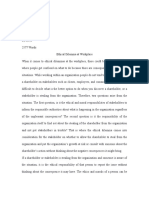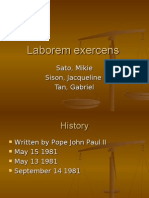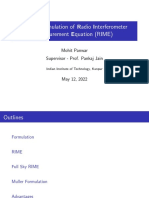Rawls's Justice As Fairness
Rawls's Justice As Fairness
Uploaded by
Duván Duque VargasCopyright:
Available Formats
Rawls's Justice As Fairness
Rawls's Justice As Fairness
Uploaded by
Duván Duque VargasOriginal Title
Copyright
Available Formats
Share this document
Did you find this document useful?
Is this content inappropriate?
Copyright:
Available Formats
Rawls's Justice As Fairness
Rawls's Justice As Fairness
Uploaded by
Duván Duque VargasCopyright:
Available Formats
Duvn Duque Vargas
PHIL 427
Professor Samuel Freeman
Rawlss Justice as Fairness
In A Theory of Justice, John Rawls sets himself to the task of finding the basic
fundamental principles that can account for our usual moral judgments regarding
institutions. To do so, he imagines the principles that rational persons in a hypothetical
ideal position of equality and freedom would agree to: equal basic liberties and fair equality
of opportunity. In this paper, I will explain further these principles and the original position,
and will show why Rawlss account of liberalism offers a more convincing and less
problematic way to explain our moral judgments than Mills.
Since Humes critique of the Locke and the social contract theory, utilitarianism has
dominated political philosophy. However, the principle of utility seems to conflict with
several of our common moral views, it seems to be inapt for thinking about justice in a
democratic society (for example, it doesnt account for equal citizenship). Rawls proposes a
revival of the social contract theory as the way to find the fundamental principles that can
explain our sense of justice in a more satisfactory way than the principle of utility. He
argued that the problems of the previous contractarian theories lied in the ways they set up
their original positions, resulting in theories that we would consider unjust. A correct
modification of the conditions of the original position would render a more general and
satisfactory theory of justice.
Before going to the details of such modification, lets take a closer look at the two
principles of which Rawlss theory of justice, justice as fairness, consists. He states the first
one in the following terms: Each person is to have an equal right to the most extensive
total system of equal liberties compatible with a similar system of liberty for all
1
. All
persons of a society must have some basic equal liberties (of conscience and association,
thought and expression, freedom of the person, political participation, and the rule of law).
However, even though Rawls defends equal rights, his theory is not one of equal
economical distribution. Inequalities offer benefits for society such as incentives and
effective systems of allocation. The question is how to make those inequalities fair, and
how to maximize the worth of the positive liberties of the first principle for the least
advantaged. This is the role of the second principle: Social and economic inequalities are
to be arranged so that they are both: (a) to the greatest benefit of the least advantaged, and
(b) attached to offices and positions open to all under conditions of fair equality of
opportunity.
2
Lets take a closer look at it. By opening offices and positions to everyone, the
principle establishes a formal equality of opportunity (where according to the law everyone
can have access to any position). However, several social contingences will still determine
who will have access to those opportunities (for example, someone born wealthy will
receive a better education that will allow him to get a better job than someone who
doesnt), so to transform this equality of opportunity from a formal one to a real one,
institutions such as a public systems of education and health care are necessary.
Nevertheless, this will never be a perfectly real equality of opportunity: social institutions
such as the family will still have a great influence on it, and even if this could ever be
neutralized, fair equality of opportunity will make a meritocratic system just (rewarding
people on the basis of their good luck at the lottery of natural talents). This is why Rawls
"
John Rawls, A Theory of Justice, p. 266.
#
Ibid.
introduces the difference principle, which states that social and economic inequalities must
benefit the least advantaged.
Hes not picturing a welfare state, where tax collection is used to cover some basic
needs while huge inequalities are still allowed; instead, in a system that follows correctly
the difference principle, every inequality will benefit the least advantaged, such as in what
he denominates a private property democracy, where concentrations of wealth are limited,
large states are heavily taxed, and mutual shares are spread throughout the whole of society,
allowing for a widespread distribution of the overall product. In this way, certain liberties
would fall under this principle and not under the first one, such as economic rights of
property and contract, having as such no priority over the second principle, and thus having
to follow it (in other words, under Rawlss theory, laissez-faire capitalism is not a just
system). It is important to note that this principle, as the other fundamental principles,
applies only at the level of the institutions, not directly to individuals (for individuals,
maximizing the goods of the least advantaged is just one good among others from which
they are free to choose).
Why does Rawls think that his social contract parties will choose these principles?
He believes the problem with the previous social contract theories, the one responsible for
their unjust outcomes, is the fact that the parties had knowledge of their respective positions
(their personal, social, and historical conditions). In other words, their original positions (or
state of nature in Hobbes and Locke) were not fair. To establish a theory of justice as
fairness one needs to start from a fair original position. To solve this, Rawls uses what he
calls the veil of ignorance. Under this veil, the parties are ignorant of the particular facts
about themselves, others, and their society. They will only have a general knowledge of
human psychology and societies to decide between different alternatives to establish the
principles that will rule their social institutions. In this way they are symmetrically situated
and have no reasons to choose arbitrary unjust positions.
With this original position settled, Rawls tests his principles by imagining a
comparison between them and other alternatives (mainly average utilitarianism, the
tradition hes going against), always from the perspective of rational mutually disinterested
parties situated in the hypothetical original position under the veil of ignorance. Under this
veil, the rational decision would be to argue for equal liberties and equal distribution.
However, once the benefit of economic inequalities is acknowledged, fair equality of
opportunity with the difference principle seems more reasonable than equal distribution.
Nevertheless, this second principle must have less priority than the first, because even
though the parties dont know particular facts about themselves, they consider equal free
persons as beings who can revise and alter their final ends and who give first priority to
preserving their liberties in these matters
3
(at least in an advanced and educated society).
The first principle secures their liberties, and as such it has priority over the second one,
which distributes the means to achieve those final ends in a fair and efficient way. This is
why they would choose these two principles over the principle of utility (which is
concerned for maximizing the average utility, not taking seriously the differences between
persons or the importance of equal rights).
Rawls also offers a more systematic way to argue for the principles from the
original position. The fact that veil of ignorance excludes all knowledge of likelihood and
particular probabilities, that the least advantaged position offered by the two principles is
acceptable, and that none of the least advantaged positions of the other alternatives is, make
it reasonable to choose the two principles over the other options (following the maximin
3
John Rawls, A Theory of Justice, 132.
rule of choice). The argument is strengthened by the fact that the decision is one that is final
and cant be changed later (having repercussions not only in ones life but in the lives of
ones descendants as well), ruling out the possibility of a rational party taking the irrational
risk of choosing an arbitrary unequal position with the hope of being favored by it (which
the principle of utility would seem to approve), and makes the maximin strategy the most
rational to apply when choosing.
Another element that is crucial against utilitarianism is the publicity condition,
according to which the fundamental principles must be known to all (which is important for
the parties, according to Rawls, and is desirable because it [embeds] ideals in first
principles with simplicity and stability
4
). So, for example, even though a utilitarian may
accept, with Rawls, that a sense of self-respect or the importance of allowing individuals
develop their plans of life make equal liberties necessary for individuals, he will consider
that it is desirable to establish them only because in that way the general and average utility
will be maximized. The publicity condition would rule out this way of thinking, because it
would pursue one principle while publicly defending others (which would either be done by
spreading false beliefs or by asking people to ignore the teleological principle that actually
rules their institutions and believe in others, making self-respect really difficult for the least
advantaged).
John Stuart Mill had already tried to solve the inconsistency between the principle
of utility and some of our most generally accepted moral judgments (especially those
regarding the equal liberties of persons). To do so, he conceived utility not as maximizing
the overall amount of pleasurable experience or satisfaction of desires but as maximizing
the exercise and development of higher capacities. In order for individuals to be able to
4
John Rawls, A Theory of Justice, 158.
exercise their higher capacities there are a set of liberties that they all must have. These
liberties must be protected by individuals in their public political lives, and therefore they
must ignore the principle of utility in those situations. However, the final purpose of these
liberties is to actually maximize overall utility (his claim is that only in a world of
guaranteed freedom and liberty, utility can be maximized).
Even though Mill argues for the legislators never to violate the principles of liberty
under the claim of the principle of utility, his arguments are not convincing enough. It
seems that under a system that views utility as the ultimate teleological good and
justification, liberties are not as strongly guarded as in one where equal liberties have the
most priority (such as in Rawls). Under utilitarianism, violating an individuals liberties for
the sake of a great overall maximizing of utility seems to be the rational thing to do (even
though our commonly held moral judgments would oppose strongly). Furthermore, Mills
concept of utility seems to favor certain human capacities over others, which would
encourage social institutions to be arranged so that those capacities are developed and
practiced by individuals. In other words, institutions would have interest in controlling
individuals activities and plans of life. Under Rawlss theory, individuals are free to
choose their own goals and plans of life, and as such enjoy more freedom and liberty than
under Mills proposal. Rawlss theory explains our common moral judgments regarding
liberalism in a more satisfactory and less problematic way than Mills.
We have seen how Rawls faces the difficult tension between our commonly
accepted moral convictions and the principle of utility with a new theory of justice that
recovers the social contract theory and modifies it to obtain, this time, a theory that matches
and explains our commonly held moral judgments regarding public institutions. From an
ideal original position of fairness and equality, in which the parties are positioned under a
thick veil of ignorance, two principles are elected over the other alternatives: basic equal
liberties (which matches our convictions of the importance of equal distribution of rights
among individuals) and fair equality of opportunity and the difference principle (which
offer a fair and efficient way to distribute inequalities throughout society). The first one, the
one that has the most priority, offers a convincing way to explain the importance of
individual rights that the principle of utility could not account for (at least not in a
convincing way). The second one offers a way to achieve both the efficiency that the
libertarians and defenders of a laissez-faire economy strive for and the fairness that
egalitarians pursue. With justice as fairness Rawls offers us a theory that can truly
account for our common moral judgments.
Bibliography
John Rawls, A Theory of Justice (revised edition 1999) (Harvard University Press)
You might also like
- Philo of Man0-Module 1Document11 pagesPhilo of Man0-Module 1Angelica ErguizaNo ratings yet
- Hac Nissan Frontier 2016Document226 pagesHac Nissan Frontier 2016JUAN CARLOS PAZ100% (1)
- Chapter2 - Introduction To EthicsDocument14 pagesChapter2 - Introduction To EthicsJenniffer Tan43% (7)
- Self-Regulation Through Goal SettingDocument36 pagesSelf-Regulation Through Goal SettingFahad MehmoodNo ratings yet
- Primary SocializationDocument16 pagesPrimary SocializationJoy CruzNo ratings yet
- Normative Ethics Readings19 20 1Document27 pagesNormative Ethics Readings19 20 1JHUZELL DUMANJOGNo ratings yet
- BI Partner Program Overview & IncentivesDocument9 pagesBI Partner Program Overview & IncentivesLuis TamaraNo ratings yet
- Pressure Loss Equations PDFDocument18 pagesPressure Loss Equations PDFcperez10000No ratings yet
- Essay About The Theory of Justice in John RawlsDocument5 pagesEssay About The Theory of Justice in John Rawlsglacuglacu100% (1)
- Bentham MillDocument6 pagesBentham MilltruedamsNo ratings yet
- Justice and FairnessDocument6 pagesJustice and Fairnessaharish_iitkNo ratings yet
- Importance of Law in SocietyDocument2 pagesImportance of Law in SocietyNgọc VõNo ratings yet
- Ethics A Philosophy of ActionDocument2 pagesEthics A Philosophy of ActionElieNo ratings yet
- Ethical Dilemma MGMT117Document9 pagesEthical Dilemma MGMT117Khan Stanikzai100% (1)
- GE EthicsDocument4 pagesGE Ethicsjoan arreolaNo ratings yet
- Global Challenges Climate ChangeDocument2 pagesGlobal Challenges Climate ChangeYong PrazNo ratings yet
- Notes From The Lectures of FR Nemy S. Que, SJ: Ph104: Foundations of Moral ValueDocument16 pagesNotes From The Lectures of FR Nemy S. Que, SJ: Ph104: Foundations of Moral ValueCris Joy Balandra BiabasNo ratings yet
- G.E. 8 Ethics M2L1Document6 pagesG.E. 8 Ethics M2L1Charmine AlbaoNo ratings yet
- A Theory of Justice by John Rawls PDFDocument15 pagesA Theory of Justice by John Rawls PDFHarsh DixitNo ratings yet
- Summary EthicsDocument5 pagesSummary EthicsLance BautistaNo ratings yet
- Laborem ExercensDocument27 pagesLaborem ExercenspixholicNo ratings yet
- Kant's Moral LawDocument10 pagesKant's Moral LawRokibul HasanNo ratings yet
- Attitude PDFDocument10 pagesAttitude PDFDaksh AnejaNo ratings yet
- The Ethical Theory of Natural LawDocument24 pagesThe Ethical Theory of Natural LawlucasNo ratings yet
- Justice and FairnessDocument2 pagesJustice and FairnessRahul ChandranNo ratings yet
- Lesson 1 GED101Document8 pagesLesson 1 GED101LOUIS MARKO ARVIE SEMA�ANo ratings yet
- Moral Theories and Mental Frames and Why They Are Important: Bydecember 12, 2020uncategorizedDocument3 pagesMoral Theories and Mental Frames and Why They Are Important: Bydecember 12, 2020uncategorizedMarlon AlanoNo ratings yet
- Chapter IIIDocument30 pagesChapter IIIWENCY DELA GENTENo ratings yet
- Cultural RelativismDocument13 pagesCultural RelativismAnny TodaiNo ratings yet
- 3 IntuitionismDocument24 pages3 IntuitionismMuneer HussainNo ratings yet
- Virtue EthicsDocument5 pagesVirtue EthicsandrealtarejosNo ratings yet
- Chapter 2Document3 pagesChapter 2jhienell100% (1)
- Module in Ethics 2022Document129 pagesModule in Ethics 2022ma.sheilamae zacateNo ratings yet
- Notes On Utilitarian EthicsDocument4 pagesNotes On Utilitarian EthicsFerrer CherrieNo ratings yet
- Distributive Justice: Ayhee Marie David Jhollie Felipe Mark Gabriel DangaDocument10 pagesDistributive Justice: Ayhee Marie David Jhollie Felipe Mark Gabriel DangaMark Gabriel DangaNo ratings yet
- Impacts of Information Technology On Society in The New Century Robert Lee Konsbruck 2012Document4 pagesImpacts of Information Technology On Society in The New Century Robert Lee Konsbruck 2012mohammedNo ratings yet
- Ethical Theory: The Greatest Happiness For The Greatest NumberDocument57 pagesEthical Theory: The Greatest Happiness For The Greatest Numberarab100% (1)
- Social MovementsDocument31 pagesSocial MovementsShahabNo ratings yet
- 4 Charles Horton Cooley PowerPointP Solomon 5555Document33 pages4 Charles Horton Cooley PowerPointP Solomon 5555Shiela Marie Nazaret - MateNo ratings yet
- PHILARTS 1 - ANTHROPOLOGY and CULTUREDocument5 pagesPHILARTS 1 - ANTHROPOLOGY and CULTUREMarielle SalasNo ratings yet
- EthicsDocument3 pagesEthicsJohn Aaron MirabelNo ratings yet
- Particularly, SDSSU Is Committed To:: A-Activity VisionDocument15 pagesParticularly, SDSSU Is Committed To:: A-Activity VisionVincent LagbasNo ratings yet
- Four Types of JusticeDocument12 pagesFour Types of JusticeACEBO, Jayvert CristobalNo ratings yet
- HBO. Lecture 1Document6 pagesHBO. Lecture 1YR100% (1)
- ETHICS Module 2Document8 pagesETHICS Module 2Maldives CanadaNo ratings yet
- Public Policy Formulation 2Document13 pagesPublic Policy Formulation 2Abdela Aman MtechNo ratings yet
- Handouts - KantDocument3 pagesHandouts - KantJan neNo ratings yet
- Ambatang, Lymie Grace TDocument2 pagesAmbatang, Lymie Grace TLymie AmbatangNo ratings yet
- Social Justic and InequityDocument41 pagesSocial Justic and InequityRollen CarisiosaNo ratings yet
- Justice As FairnessDocument15 pagesJustice As FairnessKrisha SierraNo ratings yet
- Test For EthicsDocument1 pageTest For EthicsShaggy SamNo ratings yet
- Ohn Rawls: Justice As FairnessDocument18 pagesOhn Rawls: Justice As FairnessJemaica67% (3)
- Freedom As Foundation For Moral ActsDocument40 pagesFreedom As Foundation For Moral ActsRonnJosephdelRio100% (1)
- CLSU University Code.Document262 pagesCLSU University Code.John TargetNo ratings yet
- The Significance of RH Law and Its OutcomeDocument7 pagesThe Significance of RH Law and Its Outcomeannuj738100% (1)
- Term Paper 2 - SONADocument8 pagesTerm Paper 2 - SONAElaine RelucioNo ratings yet
- Theories of Human NatureDocument4 pagesTheories of Human NatureMary Anne CaboNo ratings yet
- Romela A. Muyco Ed.D. (Mathematics)Document7 pagesRomela A. Muyco Ed.D. (Mathematics)Jose Erwin Borbon100% (1)
- Should Euthanasia Be LegalizedDocument3 pagesShould Euthanasia Be LegalizedDanekka TanNo ratings yet
- An Introduction To EthicsDocument24 pagesAn Introduction To EthicsKrishnamurthy Prabhakar96% (25)
- Theory of JusticeDocument11 pagesTheory of JusticeAsru Rojam100% (1)
- A Theory of Justice - John Rawls PDFDocument6 pagesA Theory of Justice - John Rawls PDFalyssaNo ratings yet
- A Theory of JusticeDocument6 pagesA Theory of JusticeXymon BassigNo ratings yet
- 20 Defendant Regents Opposition To The Ex Parte Application For Shortening Time 11/04/21Document4 pages20 Defendant Regents Opposition To The Ex Parte Application For Shortening Time 11/04/21José DuarteNo ratings yet
- SCIENTIFIC VASTU FOR WEST FACING HOUSE - An Architect Explains - ARCHITECTURE IDEAS PDFDocument13 pagesSCIENTIFIC VASTU FOR WEST FACING HOUSE - An Architect Explains - ARCHITECTURE IDEAS PDFmir sadat aliNo ratings yet
- Skip Tracing ToolDocument16 pagesSkip Tracing ToolNizah MarieNo ratings yet
- Shaft Seal Quick Reference Specification GuideDocument8 pagesShaft Seal Quick Reference Specification GuideBabalola SundayNo ratings yet
- Plan, Do, Check, Act: An Introduction To Managing For Health and SafetyDocument8 pagesPlan, Do, Check, Act: An Introduction To Managing For Health and SafetyMr-SmithNo ratings yet
- Marshall 4e PPT Ch02 ACCESSDocument44 pagesMarshall 4e PPT Ch02 ACCESSdeoriesglobalNo ratings yet
- Mariners Role in Collecting Evidence Handbook North of England MemberDocument70 pagesMariners Role in Collecting Evidence Handbook North of England MemberИрина Арбатманова100% (1)
- Printing Business For SaleDocument9 pagesPrinting Business For SaleSMM DATANo ratings yet
- 5040 - Assignment 1Document18 pages5040 - Assignment 1BeenishFatimaNo ratings yet
- Recruitment and SelectionDocument140 pagesRecruitment and SelectionSrinivas Suvarnam50% (2)
- Matrix Formulation of RIME by Mohit PanwarDocument18 pagesMatrix Formulation of RIME by Mohit PanwarGurmeet SinghNo ratings yet
- Home Insurance VsDocument2 pagesHome Insurance VsNathaniel TorresNo ratings yet
- Loading Guidelines: Code of Practice For The Loading and Securing of Goods On Railway WagonsDocument262 pagesLoading Guidelines: Code of Practice For The Loading and Securing of Goods On Railway Wagonsazlan.shareNo ratings yet
- Module 9Document28 pagesModule 9Acuzar's PCNo ratings yet
- HSC Board Practical Examination 2023-2024 Stream - CommerceDocument6 pagesHSC Board Practical Examination 2023-2024 Stream - CommerceshaistaNo ratings yet
- BHPV TrainingDocument30 pagesBHPV TrainingPramod KumarNo ratings yet
- Arch 158 HWDocument2 pagesArch 158 HWNilo Mateo BunaoNo ratings yet
- Actl4303 2014 S2Document6 pagesActl4303 2014 S2AlexNo ratings yet
- Raus IAS Prelims 2023 Test 2Document32 pagesRaus IAS Prelims 2023 Test 2ulaganathanNo ratings yet
- TN-988 - Ink Tank Gasket KitDocument3 pagesTN-988 - Ink Tank Gasket Kitmarcos.terezanNo ratings yet
- Coaxial Cables - Solid or Stranded CoreDocument5 pagesCoaxial Cables - Solid or Stranded CoreRicardo Jose Flores GavidiaNo ratings yet
- Broach Rotary Hassay NTDocument40 pagesBroach Rotary Hassay NTjlbrasco2No ratings yet
- Archean Chemical Industries LTD - Initiating Coverage - 19122023 - FinalDocument30 pagesArchean Chemical Industries LTD - Initiating Coverage - 19122023 - FinalaccountsNo ratings yet
- Wawtg 20240327-053234Document21 pagesWawtg 20240327-053234manthanjagatkar998No ratings yet
- Sigma VDA-100A Distribution AmpDocument9 pagesSigma VDA-100A Distribution AmpdonsterthemonsterNo ratings yet
- Aircraft Structural DesignDocument30 pagesAircraft Structural Designarun_justin_1No ratings yet
- CRP Proforma InvoiceDocument2 pagesCRP Proforma Invoicevishi2219No ratings yet

























































































